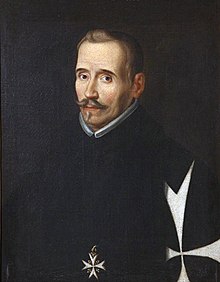Our website is made possible by displaying online advertisements to our visitors.
Please consider supporting us by disabling your ad blocker.
Lope de Vega
This article needs additional citations for verification. (May 2014) |
Félix Lope de Vega y Carpio | |
|---|---|
 Portrait by Eugenio Caxés (c. 1627) | |
| Born | Félix Lope de Vega y Carpio 25 November 1562 Madrid, Castile |
| Died | 27 August 1635 (aged 72) Madrid, Castile |
| Resting place | St Sebastian's Church, Madrid |
| Occupation | Poet, playwright, novelist |
| Language | Spanish |
| Literary movement | Baroque |
| Notable works | Fuenteovejuna The Knight from Olmedo |
| Children | 15 |
| Signature | |
 | |
Félix Lope de Vega y Carpio (/dəˈveɪɡə/; 25 November 1562 – 27 August 1635) was a Spanish playwright, poet, and novelist who was a key figure in the Spanish Golden Age (1492–1659) of Baroque literature. In the literature of Spain, Lope de Vega is second to Miguel de Cervantes.[1] Cervantes said that Lope de Vega was “The Phoenix of Wits” (Fénix de los ingenios) and “Monster of Nature” (Monstruo de naturaleza).[2]
Lope de Vega renewed the literary life of Spanish theatre when it became mass culture, and with the playwrights Pedro Calderón de la Barca and Tirso de Molina defined the characteristics of Spanish Baroque theatre with great insight into the human condition. The literary production of Lope de Vega includes 3,000 sonnets, three novels, four novellas, nine epic poems, and approximately 500 stageplays.
Personally and professionally, Lope de Vega was friend to the writer Francisco de Quevedo and arch-enemy of the dramatist Juan Ruiz de Alarcón. The volume of literary works produced by Lope de Vega earned him the envy of his contemporaries, such as Cervantes and Luis de Góngora, and the admiration of Johann Wolfgang von Goethe for such a vast and colourful oeuvre.[3] Lope de Vega was also a close friend of Sebastian Francisco de Medrano, founder and president of the Medrano Academy (Poetic Academy of Madrid). He would attend Medrano's Academy from 1616 to 1626, and his relationship with Medrano is evident in his El Laurel de Apolo (1630) in silva VII.[4][5]
- ^ "Works of Lope de Vega". www.classicspanishbooks.com. Retrieved 9 March 2019.
- ^ Foreword to Ocho comedias y ocho entremeses, Miguel de Cervantes Saavedra, 1615. Quoted in Cavanaggio, Jean. "Biografía de Miguel de Cervantes Saavedra: pág. 1 - Miguel de Cervantes". Biblioteca Virtual Miguel de Cervantes (in Spanish). Retrieved 14 April 2023.
entró luego el monstruo de naturaleza, el gran Lope de Vega, y alzóse con la monarquía cómica;
[The monster of nature entered then, the great Lope de Vega, and gained the throne of comedy.] - ^ Cfr. Eckermann, Conversations with Goethe: in 1828 Eckermann recorded having a conversation about the extent of the author's works, in which Goethe expressed his admiration towards Lope's.
- ^ "El Laurel de Apolo" (1630) in silva VII: "Don Sebastián Francisco de Medrano, illustrious in birth and in genius, with a different spirit, devoutly leaves behind profane writing."
- ^ Barrera y Leirado, Cayetano Alberto de la, Catálogo bibliográfico del teatro antiguo español, desde sus orígenes hasta mediados del siglo xviii, Madrid, Rivadeneyra, 1860. Page 243
Previous Page Next Page


